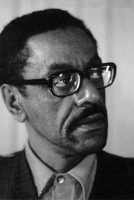 |
Duke JordanPiano, Composer |
|---|
 |
Duke JordanPiano, Composer |
|---|
"Duke Jordan has never really had the recognition he deserves. His spare, melodic style has always been distinctively individual. In addition to his thoughtful solos, he is, as always, a sensitive accompanist."
--Ira Gitler
"Duke Jordan, piano. Born Brooklyn, N.Y., 1922. An early bop pianist, a swinging one, still very much a part of jazz." This very brief biography from Barry Ulanov's A Handbook of Jazz, is Duke's only individual mention as far as I have been able to determine, in any American textbook on jazz other than the Encyclopedia Of Jazz. In all other books you will find either no mention at all, or passing references lumped together with several other names. Yet Irving Sydney Jordan, son of Brooklyn, has been paying his dues as a professional musician since shortly before World War II, and those of us who have heard him intermittently during most of the past two decades can hardly be unaware by now that this is no run-of-the-mill musician.
Duke was born of musically inclined but non-professional parents who, when he was eight, placed his musical education in the hands of a private teacher. He continued to study piano until he was 16, playing in the school band at Brooklyn Automotive High. After graduation in 1939 he joined the septet of trombonist Steve Pulliam, a group that included Jimmy Nottingham, now a top studio trumpet man. This combo, appearing in an amateur contest at the New York World's Fair that summer, won a prize and earned the attention of John Hammond, who was impressed by the teen-aged efforts of young Mr. Jordan. The unit stayed together for a year or two, after which Duke entered what was almost certainly the most important formative phase of his career.
Jazz was undergoing a quiet but vital upheaval in 1941. Around the time when Duke Jordan went to work at a club called Murrain's, on Seventh Avenue in Harlem, the experiments that were to crystalize in the form of bebop had gotten underway at several uptown clubs. The group in which Duke now worked was led, in effect, by the tenor saxophonist Ray Abrams, but it was under the nominal leadership of Clark Monroe, the veteran night club host who was involved in the operation of a series of clubs, including his own Uptown House where Charlie Parker first worked in New York.
Thus, though Duke gained his first experience in jazz through the records of Teddy Wilson, Art Tatum and their contemporaries, he was exposed early to the work of Bud Powell and Thelonious Monk, as well as to Gillespie and Parker. As I recall it, when bop first burst full-fledged on the downtown scene, Duke was one of the very first to play in what was then a revolutionary new style; in fact the only other bop pianists of any note on the 52nd Street horizon, aside from Powell himself, were Al Haig, Billy Taylor and George Wallington.
For a while Duke played with Coleman Hawkins at Kelly's Stable, in a combo similar to the one that had been organized by Clark Monroe. After this he returned to the uptown front, working for a year with a "jump band" called the Savoy Sultans, which functioned as a part-time house band at the late lamented Savoy Ballroom. But it was when he was downtown again, playing in the trio of guitarist Teddy Walters at the Three Deuces, that Charlie Parker was sufficiently impressed by Duke to hire him for his quintet. Duke worked intermittently for Bird during this period (1946-48), the other members of the group being Miles Davis, Max Roach and Tommy Potter.
"Working with Bird was a fantastic experience," says Duke. "He was such an inspiration--and often I heard him play things that were greater than anything he could do in a recording studio. My greatest regret was that I missed a chance to go to Europe with him. Bird had no work at one time, so I took the chance to go to Detroit with Paul Bascomb, and while I was there Bird was invited to France for the first jazz festival. As it turned out, I didn't get another opportunity to visit Europe until 1956, when I went to Sweden with Rolf Ericson."
During the Bird years Duke played for a few months with Roy Eldridge, recording on a big band date with Roy. Later, after leaving Bird, he worked with the Stan Getz combo in 1949. During the 1950s he free-lanced around New York, gigging with Oscar Pettiford, with off-night groups at Birdland, and also spending some time with Gene Ammons' band. In 1958 he was in Europe for a time with Kenny Dorham, Don Byas and Kenny Clarke.
It was about 1954 that Duke began to develop as a composer. His first and best known original, "Jordu," was recorded first by the Max Roach-Clifford Brown quintet; soon after, Duke cut it as a sideman with a Julius Watkins group for a ten-inch LP on Blue Note. He has written many attractive lines since then, of which the most successful have been the title tune of this album, already very popular in English jazz circles, and "Scotch Blues," which was recorded by Kenny Burrell, also on Blue Note.
--LEONARD FEATHER, from the liner notes,
Flight To Jordan, Blue Note.
A selected discography of Duke Jordan albums.
| Find Duke Jordan on Amazon.com | Find Duke Jordan on eBay.com | |
|---|---|---|
| Duke Jordan CDs on Amazon | Duke Jordan CDs and LPs on eBay | |
| Duke Jordan BOOKs on eBay |
 Music |
 Home |
 Musicians |
|---|
|
Any comments, additions or suggestions should be adressed to:
The Hard Bop Homepage / Eric B. Olsen / ebolsen@juno.com |
Other Web Sites:
The Film Noir 'net A History of Horror The War Film Web Author Eric B. Olsen |